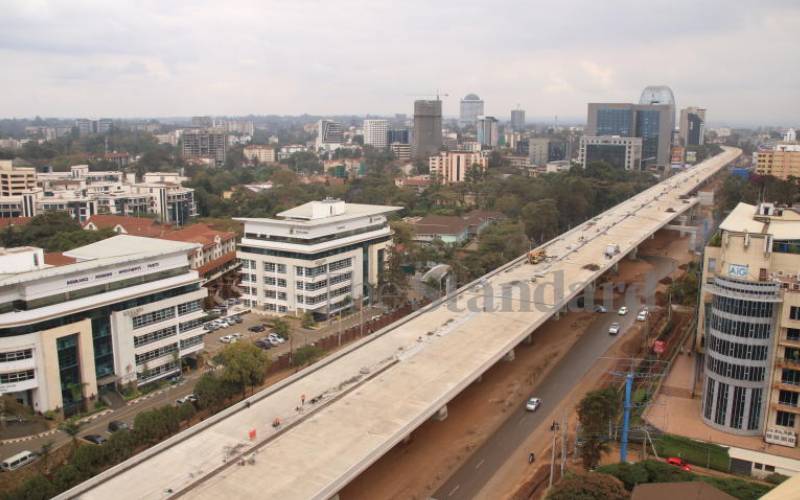At Sh2.7 billion per kilometre, the Nairobi Expressway is now Kenya’s most expensive road, raising concerns about its viability amid rising national debt.
The expressway, which is being constructed through a partnership between the Kenya National Highways Authority (KeNHA) and China Road and Bridge Corporation (CRBC) at a total cost of Sh73.5 billion, is a 27-kilometre road running from Mlolongo in Machakos County to Westlands in Nairobi.
The financing structure of the expressway is 75 per cent debt and 25 per cent equity, with the operators set to transfer the project to the Kenyan government after 30 years.
Scheduled for completion next year, it dwarfs other major road projects, with the country dotted by infrastructure undertakings that have gobbled up billions of shillings per kilometre.
Among them is Mombasa’s Dongo Kundu bypass, which until recently was the most expensive road project in the country.
The second phase of the road – an 8.9km section between Mwache Junction and Mteza – is being constructed at a cost of Sh2.66 billion per kilometre, with the entire project setting taxpayers back Sh24 billion.
Some of the reasons given for the high cost of the project are the two sea bridges linking the roads, measuring 2.1km.
The first phase, the 17km Dongo Kundu Bypass in Mombasa, cost Sh11 billion, or about Sh1 billion per kilometre.
Other costly roads include the 16.5km Nairobi Western Bypass that cost Sh17.3 billion, putting the cost per kilometre at slightly over Sh1 billion.
The Rironi–Mau Summit highway is expected to cost Sh200 billion.
A section of Dongo Kundu Bypass. [Kelvin Karani, Standard]
It is a public-private partnership (PPP) project, where the contractor, Rift Valley Highway, is expected to design, build and later operate the road, charging users to recoup its investments.
The 175km stretch will cost approximately Sh1.14 billion per kilometre.
The Northern and Eastern bypasses in Nairobi, which have been earmarked for dualling, will cost taxpayers Sh40 billion.
The two roads have a combined length of 51.6km, according to the Kenya Urban Roads Authority. This puts the per-kilometre at about Sh775 million.
While the planned works to upgrade the roads might appear relatively cheaper compared to the others costing upwards of Sh1 billion per kilometre, they are barely a decade old, raising the question of why they were not constructed as dual carriageways from the start.
The saving grace is that the road authority will not need to acquire more space, with the road reserves still intact.
This is unlike other places where road authorities have to go through the lengthy and costly process of buying out landowners.
Costlier in the city
The two roads cost a combined Sh18 billion, with the Eastern Bypass, competed in 2012, costing Sh9.3 billion, while the Northern Bypass cost Sh8.5 billion.
The oversight of not dualling the two roads when they were initially constructed will make the road among the costliest in the city.
Assuming that it will be upgraded at the project cost of Sh40 billion, it will mean the total cost (factoring in the initial) will be at about Sh60 billion, translating into Sh1.2 billion per kilometre.
The current road projects are in comparison to Thika Road, which can be said to have ushered in a new era of mega infrastructure projects in the country.
Thika Road’s upgrading into an eight-lane road, with four service lanes, cost Sh32 billion, thus about Sh600 million per kilometre for the 50km road.
Footbridge, Thika super-highway. August 5, 2020. [Elvis Ogina, Standard]
However, a lot may have changed, with costs such as labour and materials going up. The exchange rate is also a factor, with the shilling having since weakened significantly against the dollar and other major world currencies.
KeNHA has in the past said that building roads in urban areas is complex, hence the higher construction costs.
“Urban environments are significantly more costly,” said the authority in a 2018 report.
This is seen in the ongoing construction of roads such as the Kenol-Marua highway, which although 84km long, will cost Sh14 billion or about Sh166.7 million per kilometre.
This is compared to phase three of the 9.8km Ngong Road (Dagoretti Corner and Karen), which without any major bridges or overpasses, will cost Sh2.3 billion or Sh234 million per kilometre.
However, the general cost of constructing roads has over the last decade nearly doubled.
The Africa Centre for Open Governance (Africog) in a recent analysis of the cost of constructing roads in Kenya noted that the cost per kilometre has gone up by 90 per cent since 2013.
It said the cost was Sh51 million in 2013 but has since increased to Sh96 million per kilometre.
“The 3,120km of road commissioned by the Jubilee administration were contracted at a cost of Sh303 billion,” said Africog in a November 2020 report.
Corruption, it noted, could be one of the reasons the cost of building roads has been going up.
Link to story: https://www.standardmedia.co.ke/business/financial-standard/article/2001425932/the-making-of-kenyas-most-expensive-roads
